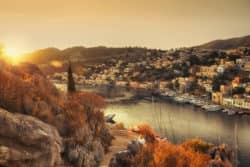About Symi, Greece
Symi (also Syme or Simi) is an island as well as a municipality. It is a mountainous island. The interior of the island of Symi is dotted with small  valleys. The coastline is both beaches and rocky cliffs. There are also isolated coves found around the coastline.
valleys. The coastline is both beaches and rocky cliffs. There are also isolated coves found around the coastline.
The main town, also called Symi, is located on the northern coast and features a harbour. The lower town, which is around the harbour, is referred to as Yialos. The upper portion of the town is known as Horio or Ano Symi.
According to Greek mythology, Symi is the birthplace of the Charities. Charities are goddesses of charm, beauty, nature, creativity, and fertility. The island would take its name from the nymph Syme.
Thucydides (an Athenian historian) wrote that during the Peloponnesian War there was a Battle of Syme. This occurred near the island in January of 411 BC. An unknown number of Spartan ships defeated the Athenian vessels.
Archaeological evidence shows that the island was likely uninhabited until the 14th century. Ruins of citadels point to the island being an important location. It would first be part of the Roman Empire and then the Byzantine Empire until its conquest by the Knights of Saint John in 1309. The island would continue to change hands several times, mainly during the modern era. In 1948, Symi would finally rejoin with Greece.
The island is well-known for its famous shrimps. They are called “Symi’s shrimps,” which are small shrimps that are pan-fried and eaten whole, shell included.
Tarpon Springs, Florida would become a sister city of Symi. The town of Tarpon Springs has a hight percentage of Greek Americans. They also have a history together as at the beginning of the 20th century, Symi sent many sponge fishermen to Florida for the “sponge rush.”
Administrative Region for Symi Island, Greece
South Aegean
Area of Symi Island, Greece
65.754 km2 (25.388 sq mi)
Population of Symi Island, Greece
2,590
Top Attractions in Symi Island, Greece
Saint Nicholas Beach – A popular and family friendly beach on the island of Symi. You can rent sun beds and umbrellas or lounge in the natural shade thanks to the trees. A lively beach with tavernas and cafes.
Pedi Bay – This is a quieter beach. Located near cafes and tavernas. The beach is accessible via foot, water taxi, and bus.
Byzantine Wine Presses – Located in Marathounda. More than 120 discovered around Symi in 1992, with 11 being restored in the Kourkouniotis area. These wine presses all date back mostly to the Byzantine era.
Monastery of Panormitis – Located in Panormitis. This is the main religious center on the island. The monastery dates back to the 15th century at least, but the exact date of construction is unknown.
Nos Beach – Just 300 meters from Symi Town, it’s the closest beach from the main town. A small, organized, and family friendly beach. Climb the hills at Nos Beach for a great view of the sea and surrounding areas.
Archaeological and Folklore Museum – Located in the town of Symi. The museums are both housed in a Venetian mansion. Features Hellenistic sculpture, ancient coins, musical instruments, traditional clothing, and Byzantine manuscripts.
Venetian Castle – Located in the town of Symi with a great view of the harbour. This was also the site of the Knights Castle, built in the 14th century by the Knights of Saint John. Castle contains an emblem of the Knights of Saint John over the main entrance.
Monastery of Roukouniotis – Located in the town of Symi. This monastery dates back to the 15th century and looks like a fortress. Monastery contains two temples, the lower containing murals from the 15th century.
Nautical Museum – 2 km from Symi Town. Established in 1983, it is now housed in a neoclassical house, where shipyards of Symi were housed in the past. Features maps. Ship models, nautical tools, and more.
Gialos Beach – 1 km northwest of Symi Town. This is a small bay with crystal water and pebbles. Sun beds and umbrellas are not available, but the beach is ideal for swimming, walking, and enjoying food at the nearby taverns.

